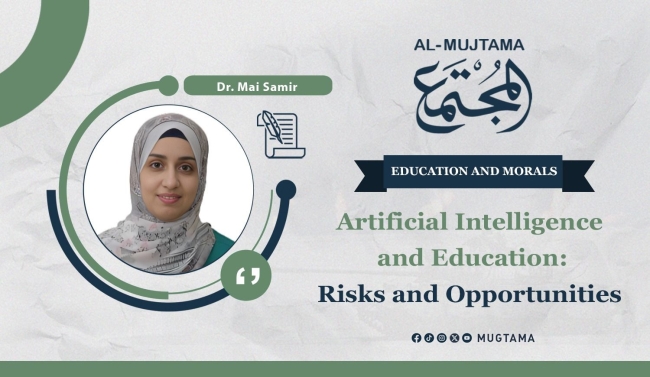Artificial Intelligence and Education: Risks and Opportunities
The controversy surrounding artificial intelligence raises divisive questions about its nature, expected roles, and potential harms across various fields. To what extent might AI shake humanity’s throne, pushing humans from the center of existence to its margins, transitioning humanity from leadership and dominance to complete dependency on AI, which could come to control human affairs in automated ways devoid of values and emotions—some of the darkest predictions even envision it as destructive to humanity.
However, the debate around AI and the future of humanity may endure, especially given the novelty of these discoveries and the ambiguity surrounding them. There is a lack of in-depth and thorough studies addressing both optimistic and pessimistic predictions about the benefits and harms of AI and its overall impact on humanity’s future.
While research on AI is still cautious, attempting to explore and delve into its essence, the field’s rapid development has sparked a wildfire effect. Despite the recent leap that produced more advanced forms of AI, it is now available to a massive number of users eager to maximize the benefits and profitability of this unprecedented scientific breakthrough. Consequently, it has become an integral part of all aspects of life, especially in the business sector, pushing many job seekers to develop skills necessary to interact efficiently with AI, which has emerged both as a subject and tool of learning simultaneously.
One of the Prominent Dangers of AI is its Potential to Exacerbate Inequality Between Developed and Poorer Nations
AI’s introduction into education has posed a challenge to educational systems worldwide, asserting itself as an indispensable component for any system seeking structural modernization and aiming to meet labor market demands.
The immense popularity of educational topics and materials that showcase AI tools and their applications in learning is evident on social media platforms. Teachers are increasingly employing AI tools in educational processes, either to facilitate teaching or to detect potential cheating by students who are more inclined toward using AI for academic research and tasks.
Exploring the dangers
This widespread use of AI should not detract from a cautious exploration of its dangers. Most criticism of AI's potential harms focuses on technical issues, such as difficulties in establishing the necessary infrastructure for its efficient operation, including high-speed, high-capacity network systems, advanced electronic devices supporting the latest AI versions, secure cloud storage, cybersecurity issues, privacy concerns, among others. However, the real dangers of AI extend to more pressing areas that require greater attention.
Among these pressing dangers is the widening inequality between advanced and impoverished nations, given the vast divide between technologically advanced countries (a minority worldwide) and the numerous developing and underdeveloped nations that lack the necessary infrastructure and skilled human resources, exacerbated by widespread poverty, illiteracy, and civil wars. This suggests that advanced nations could leverage this technological leap in AI to create far more sophisticated educational systems, making it nearly impossible for youth in poorer, underdeveloped nations to access these advanced systems.
AI Offers Powerful Opportunities to Enhance Educational Effectiveness, Promoting Smoother, More Efficient Processes
Since the educational system is the channel through which labor market skills are developed, the absence of AI from developing countries means depriving their workforce of entry into advanced labor markets due to the lack of this technology in their educational systems, which threatens to deepen global inequality and solidify poverty and backwardness in the Global South.
On the other hand, the excessive reliance on AI due to the fascination with its capabilities gradually stifles human creativity and critical thinking among youth. This is evident in the widespread misuse by many users who have come to believe AI can fully replace humans, using it for schoolwork and research to reduce the effort exerted in education; this trend risks diminishing educational standards for future generations. Hence, it is crucial to establish strict ethical guidelines to regulate AI’s operation and clarify its permitted and legitimate uses by those in charge of education.
Seizing opportunities
In contrast to the risks of deepening inequality and potential misuse, AI offers powerful opportunities to enhance educational effectiveness, making processes smoother and more efficient while expanding educational access to many social groups, especially those with special needs.
Additionally, AI provides broad options for learners by designing tailored educational programs that meet each student’s individual needs, according to their level, exceeding one of the biggest drawbacks of standardized education, which enforces uniform curricula regardless of students’ levels and abilities. This boosts the efficiency and outcomes of the educational process, as AI tools assist teachers with a wide range of resources to help deliver information and foster greater interaction with students.
AI Requires Internationally Agreed-upon Ethical Charters to Prevent Misuse
Despite the aforementioned dangers and opportunities, AI, despite the significant risk it poses to several practical and economic fields, may not threaten the educational field specifically, given the crucial role the human element plays in this domain. The teacher’s interactive roles and educational and moral responsibilities toward students cannot be replaced by a “robot” devoid of feelings and unable to engage in human communication. At worst, AI could disrupt the educational process by fostering cheating and plagiarism, issues that can be countered by implementing strict educational policies.
Ultimately, like all recent scientific discoveries, AI requires meticulous regulation through internationally agreed-upon ethical charters to prevent misuse. Furthermore, international human rights organizations must work to ensure all countries can benefit equally from AI to prevent deepening inequality, which could threaten global security and peace and undermine equal opportunities for new generations worldwide.
-------------------------------------------------------------


